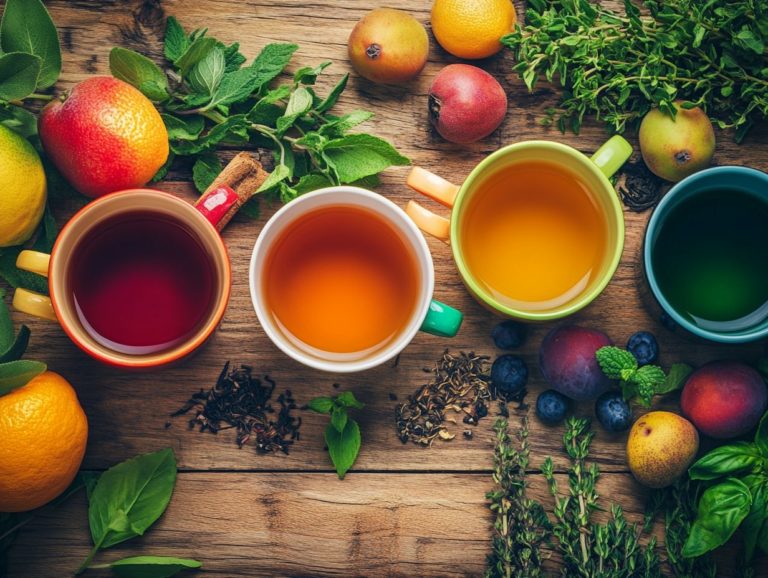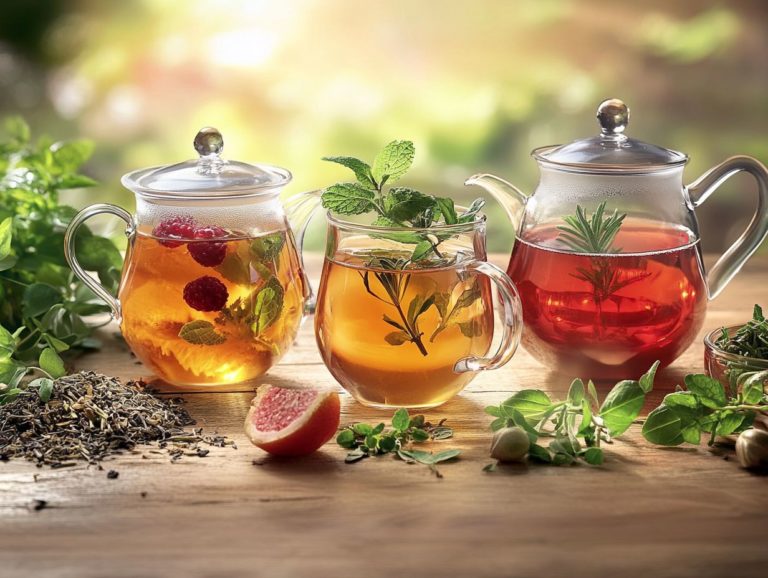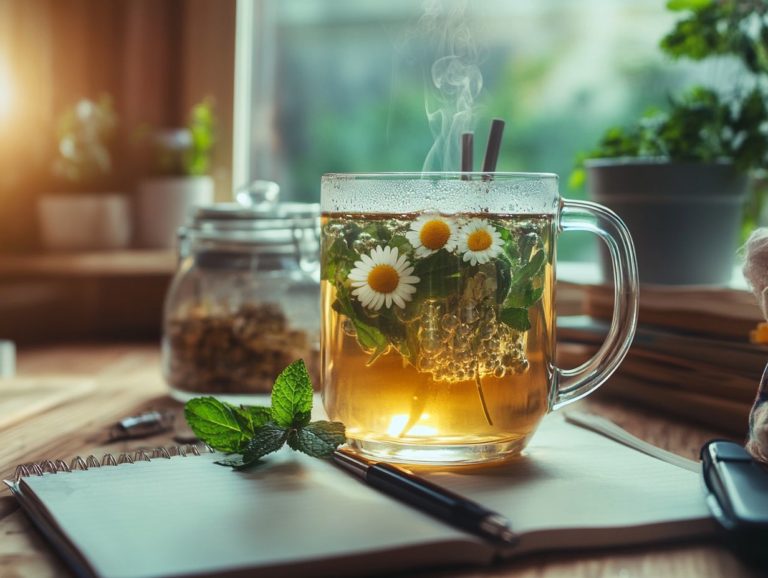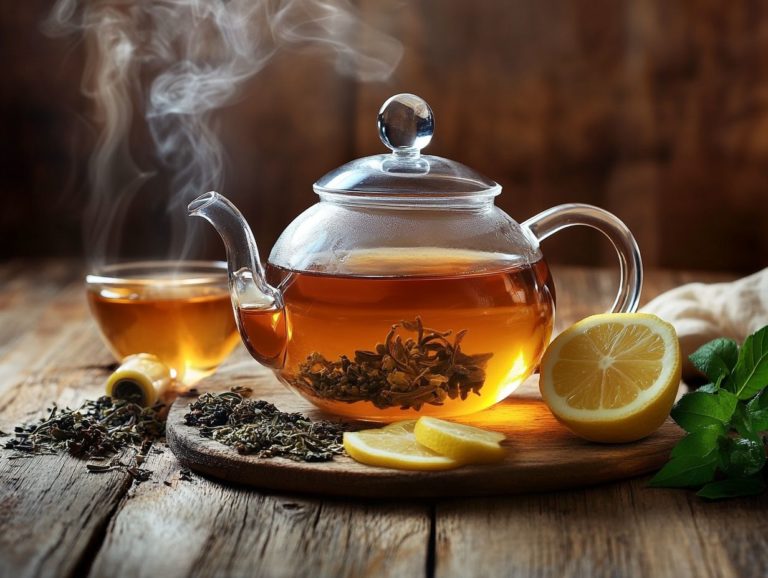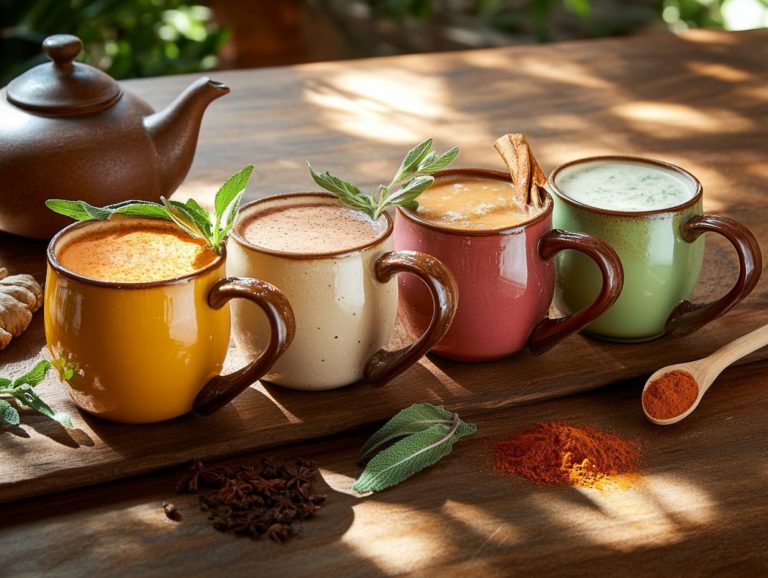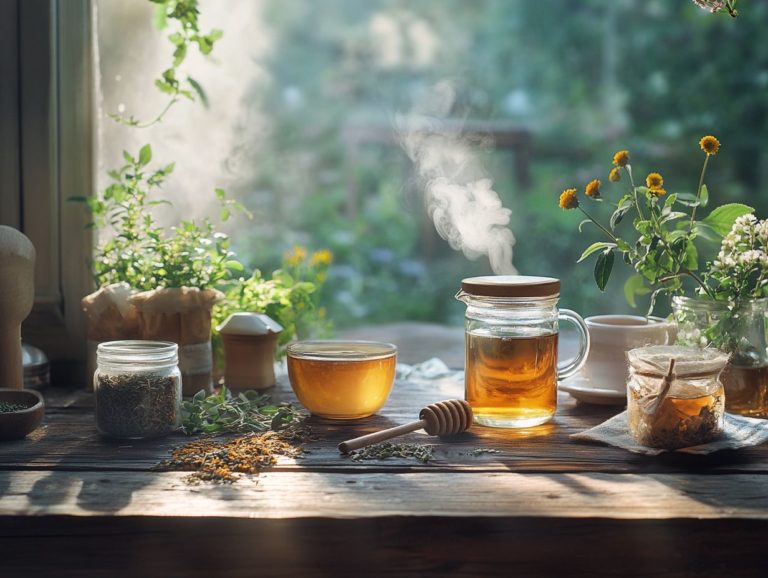Herbal Tea for Menstrual Relief: Top Picks
Menstrual discomfort can pose a significant challenge, but nature offers a range of soothing solutions to help alleviate those painful days.
This article delves into a selection of herbal teas celebrated for their ability to provide menstrual relief. From chamomile to cramp bark, these herbal remedies not only tantalize your taste buds but also come with a host of benefits to support your body during this time.
You ll discover how often to indulge in these teas, potential side effects to be aware of, and whether they can serve as a substitute for traditional medications. Keep reading to find your ideal cup of comfort!
Contents
- Key Takeaways:
- 1. Chamomile Tea
- 2. Ginger Tea
- 3. Peppermint Tea
- 4. Raspberry Leaf Tea
- 5. Dandelion Tea
- 6. Fennel Tea
- 7. Cinnamon Tea
- 8. Lemon Balm Tea
- 9. Red Clover Tea
- 10. Nettle Tea
- 11. Licorice Root Tea
- 12. Yarrow Tea
- 13. Black Cohosh Tea
- 14. Dong Quai Tea
- 15. Cramp Bark Tea
- How Can Herbal Tea Help with Menstrual Relief?
- Frequently Asked Questions
- How can herbal tea help relieve menstrual pain?
- Which herbal teas are recommended for menstrual relief?
- How do I prepare herbal tea for menstrual relief?
- Is it safe to drink herbal tea for menstrual relief during my period?
- Are there any side effects of drinking herbal tea for menstrual relief?
- Can herbal tea completely replace over-the-counter medication for menstrual relief?
Key Takeaways:
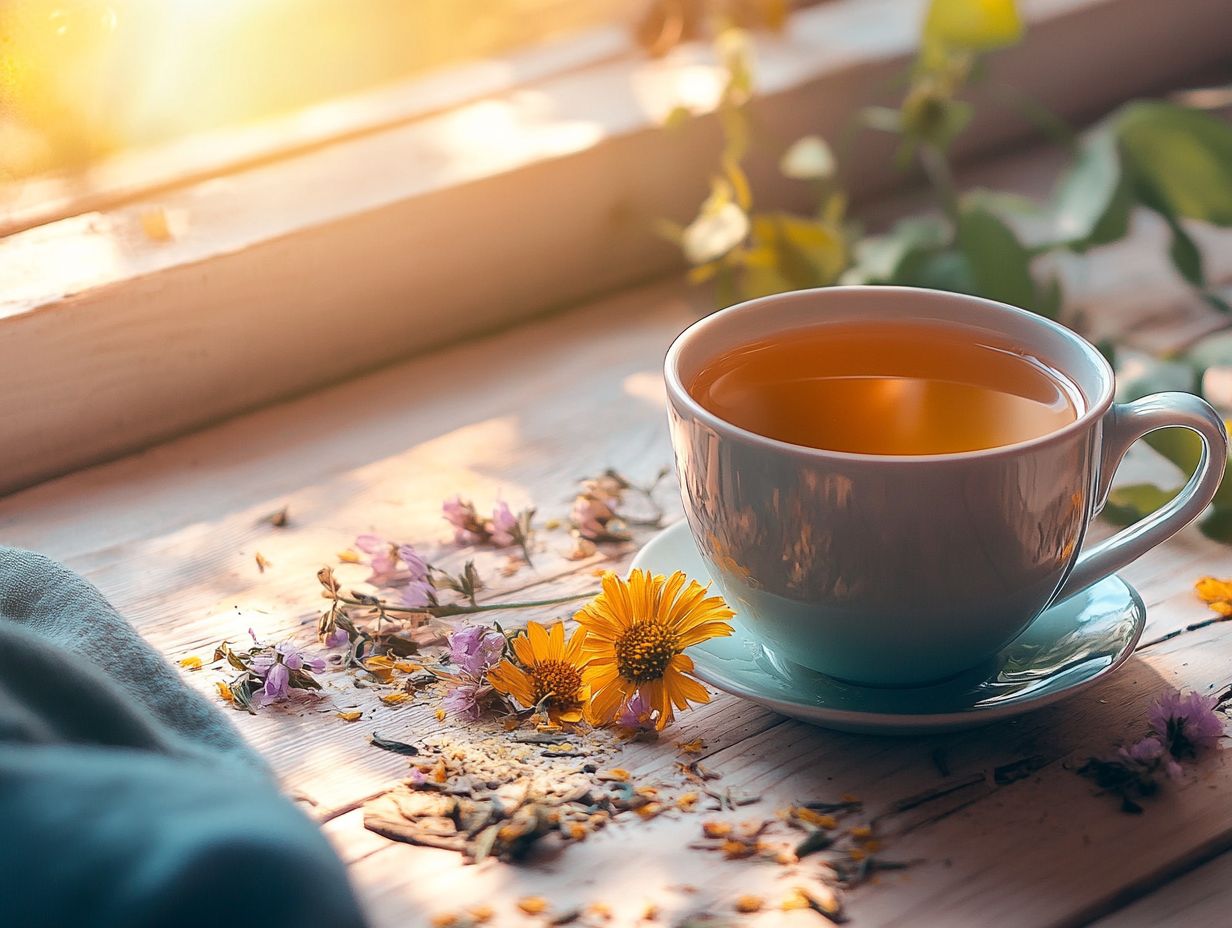
- Chamomile, ginger, and peppermint tea are top herbal picks for menstrual relief due to their anti-inflammatory properties and ability to ease menstrual cramps.
- Herbal teas with key ingredients like raspberry leaf, fennel, and cinnamon can help balance hormones and alleviate PMS symptoms.
- It is recommended to drink herbal tea for menstrual relief a few days before and during your period as needed. Consult with a doctor for specific dosages and potential drug interactions.
1. Chamomile Tea
Chamomile tea is a celebrated herbal remedy, renowned for its natural ability to alleviate menstrual cramps. This makes it a favored choice for those seeking comfort during their menstrual cycle.
Its rich, floral flavor presents a delightful sweetness that many find more appealing than other herbal options like ginger or peppermint, which can be spicier or sharper in taste.
Research highlights chamomile s anti-inflammatory effects, showing that regular consumption can significantly reduce the severity of menstrual pain. Historically, it has been embraced in traditional medicine for its calming properties and digestive benefits.
By steeping dried flowers in hot water, you create a soothing elixir that not only alleviates physical discomfort but also promotes relaxation. Chamomile tea is a wonderful option for relief!
2. Ginger Tea
Ginger tea is a renowned herbal remedy celebrated for its powerful anti-inflammatory properties, making it an effective solution for menstrual pain and discomfort. This traditional medicine has been used for centuries to alleviate dysmenorrhea, with studies suggesting it may even compete with over-the-counter pain medications.
Add ginger to your routine for its health benefits, enhancing your overall well-being during your menstrual cycle. Just steep fresh ginger slices in hot water for about 10 minutes, allowing its essential oils to meld beautifully. A touch of honey or lemon can elevate both its flavor and nutritional value.
Research indicates that ginger reduces uterine contractions, significantly lessening the intensity of menstrual cramps. Try ginger tea today for a natural way to ease cramps! A study published in the Journal of Alternative and Complementary Medicine suggests that women who enjoy ginger are more likely to experience reduced discomfort compared to those relying solely on conventional painkillers. This positions ginger as a valuable ally during that time of the month.
3. Peppermint Tea
Peppermint tea is more than just a refreshing beverage; it s a powerful herbal remedy that helps relieve cramps, making it an invaluable companion for anyone facing menstrual issues. Rich in menthol, peppermint tea works wonders in relaxing the muscles and easing those pesky menstrual cramps.
It promotes a sense of comfort during your cycle. Its soothing properties even extend to your mind, providing relaxation that can significantly enhance your overall well-being during this challenging time.
To prepare this aromatic tea, simply steep dried or fresh peppermint leaves in boiling water for about five to ten minutes. This allows the essential oils to fully release their potential.
The invigorating aroma alone can uplift your mood, creating a calming atmosphere that s perfect for relaxation. This herbal infusion reduces muscle tension and may alleviate the intensity of menstrual pain.
By incorporating peppermint tea into your routine, you may find yourself navigating monthly discomforts with greater ease, all while enjoying a delightful taste and therapeutic relief.
4. Raspberry Leaf Tea
Raspberry leaf tea is a gem in herbal medicine, renowned for its potential to support women’s health. It can be particularly effective in easing menstrual pain and promoting healthy uterine contractions throughout the menstrual cycle.
Packed with nutritional benefits, this herbal infusion becomes a favored choice for women seeking natural remedies for menstrual cramps. Its soothing qualities make raspberry leaf tea a delightful and comforting addition to your herbal repertoire.
To prepare this tea, simply steep dried raspberry leaves in hot water for about 10-15 minutes. This allows the rich flavors and nutrients to meld beautifully.
Regular enjoyment of this brew is thought to help regulate menstrual cycles, potentially alleviating heavy bleeding and minimizing discomfort. Specific vitamins and minerals in the leaves may enhance uterine muscle tone, offering relief for those who face irregularities or painful menstruation.
Many women have shared their positive experiences with this tea, praising its ease of preparation and effectiveness. This can lead to a more balanced and healthier menstrual experience.
5. Dandelion Tea
Don t overlook dandelion tea! It’s a powerful herbal remedy packed with health benefits, especially when it comes to managing inflammation and providing menstrual relief.
Its properties help reduce bloating and discomfort that often accompany your menstrual cycle, making it a valuable addition to your herbal remedy toolkit. By incorporating dandelion tea into your routine, you can experience its soothing effects during those challenging days.
This herbal infusion is also packed with antioxidants and vitamins, contributing to your overall well-being. Research highlights that the anti-inflammatory properties of dandelion can ease uterine contractions, potentially reducing pain during menstruation.
Consistent consumption may even help regulate your menstrual cycles and promote liver health, amplifying its effectiveness as a natural remedy.
As more individuals gravitate toward holistic health solutions, dandelion tea stands out as an accessible and beneficial option for those particularly struggling with menstrual discomfort. Start brewing your herbal remedy today and ease your menstrual discomfort naturally!
6. Fennel Tea
Fennel tea is a delightful herbal infusion celebrated for its ability to reduce swelling and pain, especially during your menstrual cycle. Discover your new best friend in fennel tea!
Fennel tea is rich in phytonutrients. It eases menstrual cramps and supports your digestive health, making your cycle more comfortable.
Preparing fennel tea is easy simply crush some fennel seeds and steep them in hot water. This extracts their aromatic oils, resulting in a warm, slightly sweet infusion that’s both refreshing and comforting.
Beyond its pleasant taste, this tea is praised for its ability to relax the muscles of the uterus, offering a natural remedy during those challenging days.
Research suggests that the compounds in fennel may help maintain hormone balance, enhancing its effectiveness in alleviating menstrual discomfort. Regular consumption can lead to significant relief, establishing fennel tea as a reliable ally for those experiencing particularly severe cramps.
7. Cinnamon Tea
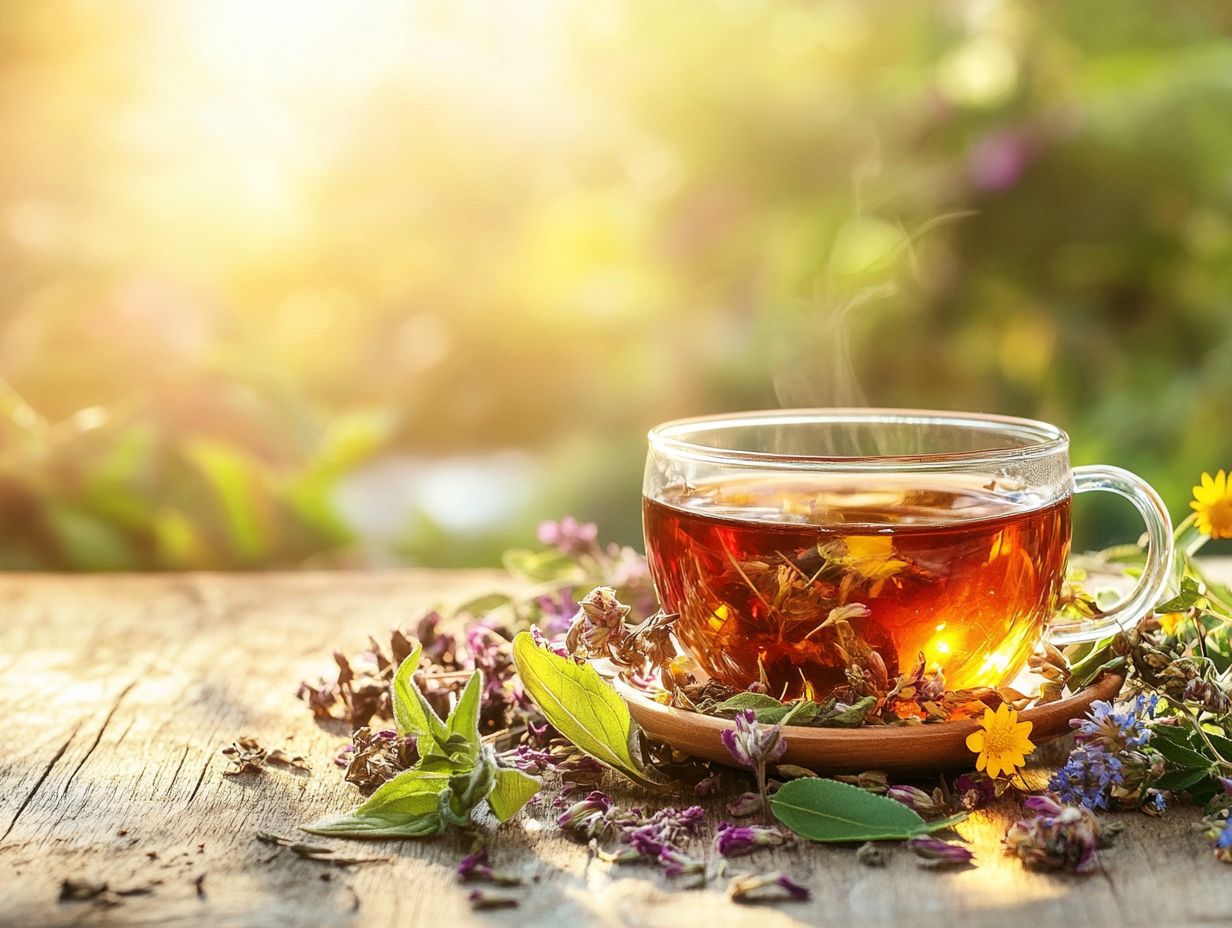
Cinnamon tea is not just a delightful herbal beverage; it s a powerful natural remedy for menstrual pain relief. Its remarkable ability to reduce swelling and pain makes it a go-to choice for anyone seeking comfort during their cycle.
Preparing this revitalizing drink is simple: steep cinnamon sticks or ground cinnamon in hot water, allowing the essential oils to infuse and create a calming experience.
Many users find that regular consumption also helps alleviate other bothersome symptoms, such as bloating and mood swings.
Studies show cinnamon helps reduce painful periods, thanks to its anti-inflammatory properties. Research published in the Journal of Clinical Medicine found that the active compounds in cinnamon can help regulate menstrual flow and minimize pain, reinforcing its long-standing reputation in traditional medicine.
8. Lemon Balm Tea
Lemon balm tea is your go-to herbal infusion for calming moments. It promotes relaxation and eases those pesky menstrual cramps. Its mild sedative properties work wonders in reducing stress and anxiety, making it a reliable ally during your cycle.
Making this gentle brew is easy: steep fresh or dried lemon balm leaves in boiling water for about 5 to 10 minutes, allowing the essential oils and compounds to properly infuse.
Research has shown that lemon balm can effectively reduce muscle tension and discomfort during menstruation, providing extra relief for anyone plagued by cramps.
A study published in a reputable journal underscores its effectiveness in decreasing the severity of discomfort, echoing many women s experiences. Lemon balm tea nourishes your body and uplifts your spirit, making it a cherished companion during those trying times.
9. Red Clover Tea
Red clover tea is a distinctive herbal infusion rich in plant compounds that act like estrogen. This makes it an excellent choice for anyone navigating menstrual disorders or discomfort during their cycle. This herbal tea can assist in balancing hormones and delivering essential nutrients, potentially easing symptoms associated with menstrual pain.
To prepare the tea, simply steep dried red clover flowers in hot water. This process releases beneficial compounds, allowing you to harness their effects. Numerous studies suggest that the plant compounds found in red clover may help regulate hormonal fluctuations and alleviate issues like cramps and mood swings.
Research published in the Journal of Obstetrics & Gynecology reveals that women who consume red clover extracts report significant improvements in symptoms related to menopause and premenstrual syndrome (PMS). By incorporating this calming beverage into your routine, you could unlock a natural ally in managing your menstrual health and achieving a more balanced hormonal state.
10. Nettle Tea
Nettle tea is a nutrient-rich herbal infusion revered for its anti-inflammatory properties, making it ideal for easing menstrual cramps and discomfort. This delicious tea packs a punch with iron, calcium, and magnesium essential nutrients that help maintain energy levels and combat fatigue often experienced during menstruation.
Research suggests that the bioactive compounds found in nettle, such as flavonoids and carotenoids, play a significant role in pain relief and mood enhancement. A study published in the *Journal of Midwifery & Women’s Health* noted that women who consumed nettle tea reported a reduction in pain intensity and a shorter duration of cramps.
By soothing your body and providing essential nutrients, nettle tea can be a natural solution for menstrual relief, allowing you to navigate your cycle with greater ease. For even more soothing options, consider trying the 5 best herbs for calming herbal teas. Why not brew a cup today and feel the difference?
11. Licorice Root Tea
Licorice root tea is a delightful herbal infusion that offers a wealth of health benefits, especially for those managing menstrual disorders. Its remarkable ability to promote hormonal balance makes it a go-to choice for women seeking natural relief from menstrual cramps and a boost to overall reproductive health.
But it’s not just the taste that makes this tea special. Licorice root contains compounds like glycyrrhizin, which can mimic estrogen in the body potentially aiding in hormone regulation. Research indicates that the anti-inflammatory properties of licorice root may offer significant relief from menstrual cramps, alleviating pain and discomfort for many.
By regularly sipping on this tea, you can support your adrenal health, a key player in maintaining hormonal balance. Incorporating licorice root tea into your wellness routine not only enhances your menstrual health but also contributes to your overall vitality and well-being.
12. Yarrow Tea
Yarrow tea stands out as a traditional herbal remedy celebrated for its anti-inflammatory properties, making it an excellent choice for anyone seeking menstrual relief during their cycle. This herbal infusion has been a trusted ally for centuries, easing cramps and promoting overall comfort proof of its time-honored effectiveness in managing dysmenorrhea.
Historical records reveal that yarrow has been employed since ancient times, particularly within herbal traditions across Europe and Asia. Practitioners recognized its remarkable ability to alleviate various ailments, including menstrual discomfort.
Modern studies are beginning to validate these ancient claims, demonstrating that yarrow can significantly reduce the severity of cramps and enhance emotional well-being during menstruation. The active compounds in yarrow, such as flavonoids and tannins, are believed to contribute significantly to its pain-relieving properties, positioning it as a scientifically supported choice for those in search of natural solutions to menstrual pain. Share your experiences with yarrow tea and join the community of those embracing natural wellness!
13. Black Cohosh Tea
Black cohosh tea is an herbal infusion celebrated for its remarkable ability to support hormonal balance and ease painful menstrual cramps. This makes it an ideal choice for women during their menstrual cycle. With a rich history in traditional medicine, this powerful remedy has been used to manage dysmenorrhea symptoms and promote overall reproductive health.
Recent studies have begun to spotlight its potential in alleviating discomfort. The compounds within black cohosh may influence hormone levels and reduce inflammation. Traditionally, women have relied on this herb not only for immediate relief from menstrual pain but also as a preventive measure against various menstrual disorders.
By incorporating black cohosh tea into your diet, you might experience a more balanced hormonal environment. This leads to fewer mood swings and enhanced overall well-being during your cycle. It s a compelling choice for anyone seeking to naturally support their menstrual health!
14. Dong Quai Tea
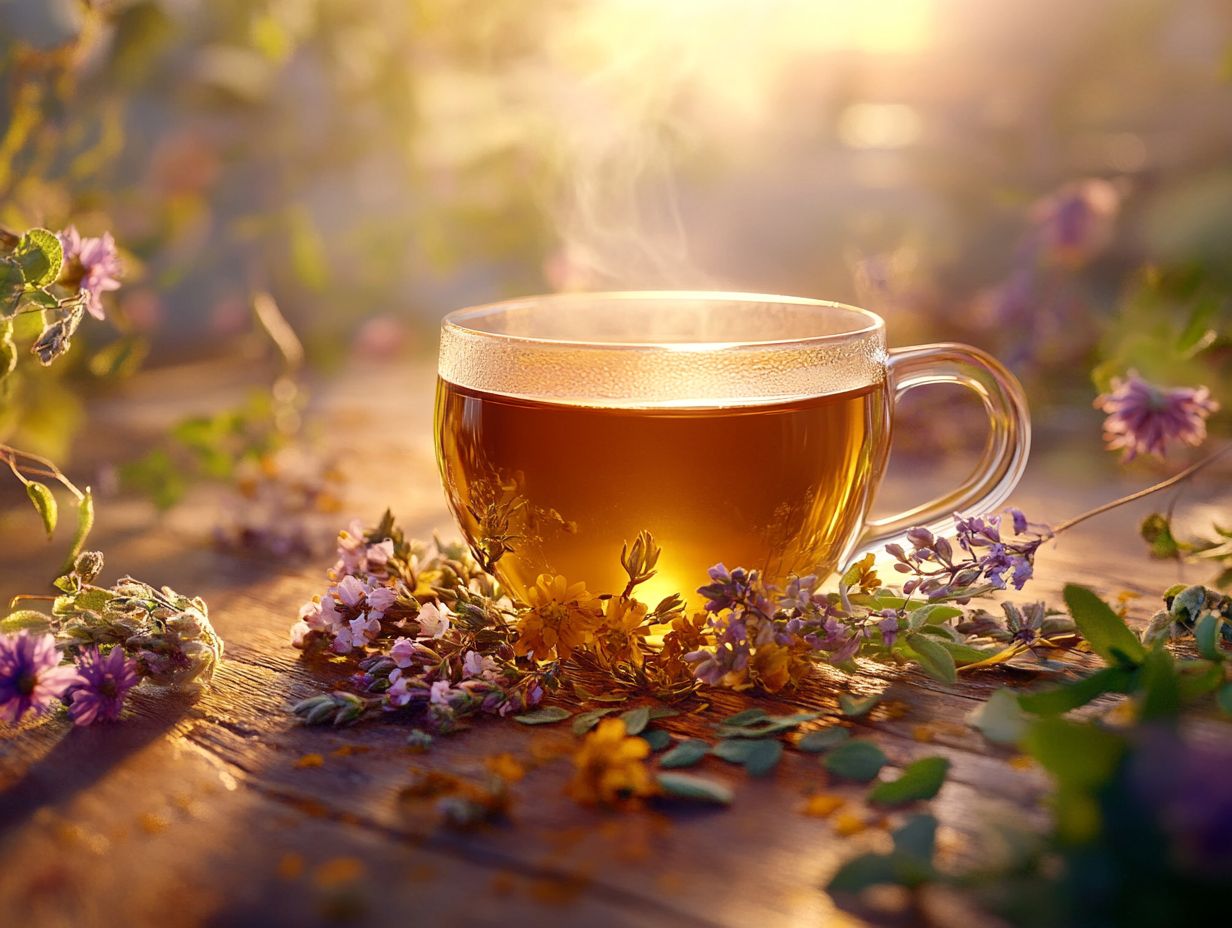
Dong quai tea, often dubbed ‘female ginseng’, is a celebrated herbal remedy that can support hormonal balance and alleviate menstrual disorders. This herbal infusion may help ease menstrual cramps and enhance your overall reproductive health, providing a natural approach to managing discomfort.
For centuries, this herbal blend has been utilized in Chinese and various traditional herbal systems. It is valued not only for its soothing effects but also for its ability to nourish and invigorate the blood. To prepare it, simply steep the dried roots in hot water, allowing those beneficial compounds to infuse beautifully into the liquid.
Recent studies suggest that the active constituents in dong quai, like ferulic acid and ligustilide, may significantly reduce menstrual pain. Embracing this ancient remedy enables you to take control of your menstrual health naturally, without solely relying on pharmaceutical interventions.
15. Cramp Bark Tea
Cramp bark tea is a remarkable herbal remedy celebrated for its properties that help relax muscles. It is an excellent choice for easing menstrual cramps and discomfort. This herbal infusion has been used for ages to calm uterine contractions, providing much-needed relief during your menstrual cycle.
Historically, indigenous cultures and herbalists have relied on this plant for centuries. It is often considered a go-to solution for various reproductive concerns. Recent studies are beginning to shed light on its potential benefits. Research suggests that cramp bark may help reduce both the intensity and frequency of menstrual cramps by relaxing the smooth muscles of the uterus.
This effect alleviates immediate discomfort and supports overall menstrual health, offering a holistic approach to managing menstrual disorders. As more women seek natural alternatives, cramp bark tea emerges as a promising option, combining centuries of traditional wisdom with modern scientific insights!
Don’t let menstrual cramps hold you back discover the power of cramp bark tea today!
How Can Herbal Tea Help with Menstrual Relief?
Herbal tea can be a natural remedy for menstrual relief. It harnesses a blend of soothing properties to ease the discomfort of cramps. Many herbal teas are packed with beneficial compounds that can effectively reduce uterine contractions. By integrating these natural remedies into your routine, you ll discover effective solutions for managing menstrual pain and promoting comfort.
Consider varieties like chamomile, which is rich in antioxidants and helps relax your muscles. Ginger tea is renowned for its properties that may inhibit pain. Peppermint tea can be your go-to for alleviating headaches and digestive issues that often accompany menstruation. Meanwhile, raspberry leaf tea is known to strengthen uterine muscles and ease spasms. For those looking to improve digestive health, exploring the 5 best herbal teas for digestive health can provide great options.
The science behind these benefits lies in compounds like flavonoids and phenolic acids, which help modulate pain pathways. To make the most of these herbal teas for relaxation, consider using herbal tea for stress relief and aim to enjoy two to three cups daily. Start a week before your expected period to maximize their soothing effects and ensure a more comfortable experience.
What Are the Key Ingredients in Herbal Tea That Aid in Menstrual Relief?
The key ingredients in herbal tea that aid in menstrual relief include natural elements like ginger, fennel, and chamomile. Each one is celebrated for its unique properties in alleviating cramps and discomfort. These herbs are packed with anti-inflammatory and anti-spasmodic qualities, effectively reducing pain and enhancing relaxation during your cycle.
Ginger is renowned for improving circulation and easing nausea, a common symptom during your period. Fennel helps regulate estrogen levels, promoting hormonal balance. Chamomile not only invites relaxation but also serves as a mild sedative, making it an ideal companion on stressful days. For those looking to stay hydrated, incorporating herbal teas for lasting hydration can be beneficial.
Studies show, including those from the Journal of Obstetrics and Gynaecology, that these herbs can ease menstrual pain. To prepare an effective herbal tea, steep a teaspoon of crushed ginger, fennel seeds, or dried chamomile flowers in hot water for 10 to 15 minutes. For optimal hydration, you might also explore the 5 best herbal teas for hydration and sweeten your blend with honey for a comforting experience that supports your body during its monthly cycle.
How Often Should One Drink Herbal Tea for Menstrual Relief?
Make it a goal to enjoy herbal tea regularly ideally several times a day during your menstrual cycle, especially when cramps strike. Consistent consumption of herbal infusions enhances their effectiveness in easing pain and promoting relaxation. Understanding how often to indulge in these natural remedies can elevate your relief experience.
It’s wise to incorporate a variety of herbal teas such as ginger, chamomile, and peppermint. Adjust the amounts to what feels comfortable for you and the intensity of your cramps. Many find that sipping these warm beverages three to five times daily, particularly in the first few days of menstruation when pain peaks, can significantly alleviate discomfort. For added relief, consider exploring herbal tea for anxiety relief as well.
Research shows that ingredients like ginger boast properties that can provide even more relief. Each body responds uniquely, so tweaking the frequency and types of teas based on your personal experience will yield the best results.
Are There Any Side Effects of Drinking Herbal Tea for Menstrual Relief?
Herbal tea can be a soothing option for menstrual relief, but it s important to be aware of potential side effects. This is especially true if you have specific sensitivities or consume it in large amounts. Some herbs can interact with medications, so it’s wise to consult your healthcare provider before adding them to your routine. Being informed ensures you have a safe and beneficial experience with herbal remedies.
The effects of herbal ingredients can vary from person to person, influenced by factors like age, existing health conditions, and individual sensitivities. For example, chamomile might trigger allergic reactions in those sensitive to similar plants. Ginger could cause gastrointestinal discomfort for some. Other herbal teas, like raspberry leaf, are often praised for their benefits but may lead to unexpected reactions, such as cramping, in others.
Understanding your unique body chemistry and seeking professional advice can help you navigate the complexities of herbal remedies and fully harness their potential.
Can Herbal Tea Replace Traditional Medications for Menstrual Relief?
Herbal tea can be a complementary approach to traditional medications for menstrual relief. It may provide a natural remedy that alleviates pain and discomfort during your menstrual cycle. While many herbal teas help reduce swelling and pain, they might not fully replace conventional treatments for everyone, depending on individual circumstances and symptom severity.
Understanding how these natural remedies can work alongside traditional therapies helps you make informed choices.
Research shows that certain herbal options, like chamomile and ginger, can significantly ease symptoms. They provide soothing benefits that could enhance the effectiveness of conventional treatments. Additionally, exploring herbs for relieving PMS symptoms may offer alternative relief. However, it’s crucial to consider your personal preferences and specific symptom profiles when contemplating any treatment regimen.
Engaging in open discussions with healthcare providers about incorporating herbal remedies alongside prescribed medications is essential. This ensures your choices are based on solid evidence and tailored to your unique health needs.
Frequently Asked Questions
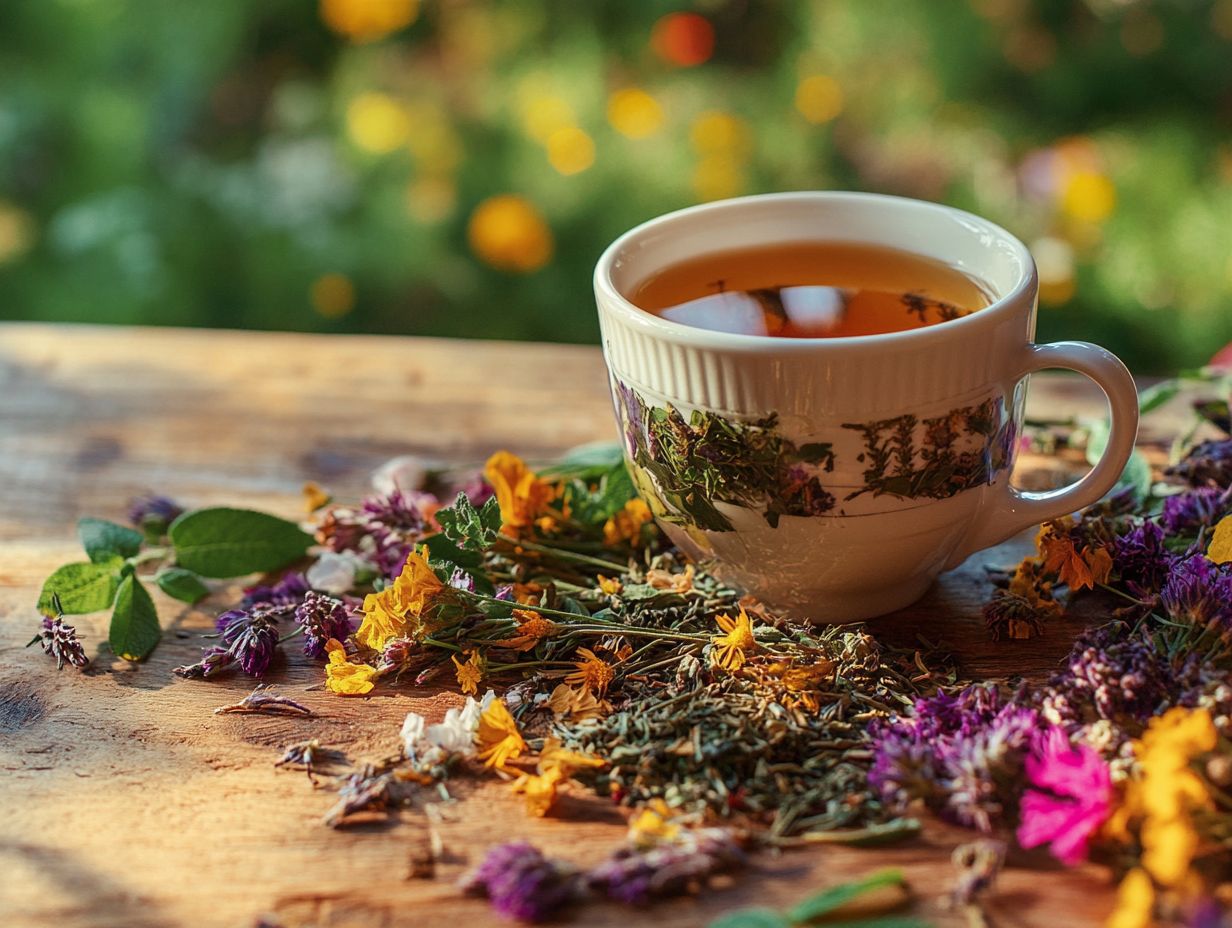
How can herbal tea help relieve menstrual pain?
Herbal teas have been used for centuries to ease menstrual discomfort. They contain natural ingredients that can soothe cramps, reduce bloating, and help regulate hormone levels, providing a more comfortable menstrual cycle.
Which herbal teas are recommended for menstrual relief?
Top picks for herbal teas for menstrual relief include chamomile, ginger, peppermint, raspberry leaf, and dandelion. These herbs help reduce swelling and pain, ease cramps, reduce bloating, and balance hormones.
How do I prepare herbal tea for menstrual relief?
To prepare herbal tea for menstrual relief, steep one teaspoon of dried herbs in a cup of hot water for 5-10 minutes. You can also use tea bags or loose tea leaves in a tea infuser. Make sure to strain the herbs before drinking.
Is it safe to drink herbal tea for menstrual relief during my period?
Yes, it is safe to drink herbal tea during your period. However, it’s advisable to consult with your doctor before trying any new herbal remedies, especially if you have a pre-existing medical condition or are taking medications.
Are there any side effects of drinking herbal tea for menstrual relief?
Generally, herbal teas are safe and have minimal side effects. However, some herbs may interact with medications or cause allergic reactions. Always check the ingredients of the herbal tea and consult with your doctor if you experience any adverse reactions.
Start your journey to menstrual comfort today by exploring herbal tea options!
Can herbal tea completely replace over-the-counter medication for menstrual relief?
Looking for relief from menstrual pain? Herbal tea might be just what you need!
Herbal tea can help with menstrual relief. However, it may not fully replace over-the-counter medication.
If you have severe cramps or a medical condition causing intense pain, consult your doctor. Follow their recommended treatment plan.
You can use herbal tea alongside other treatments to ease discomfort during your menstrual cycle.

